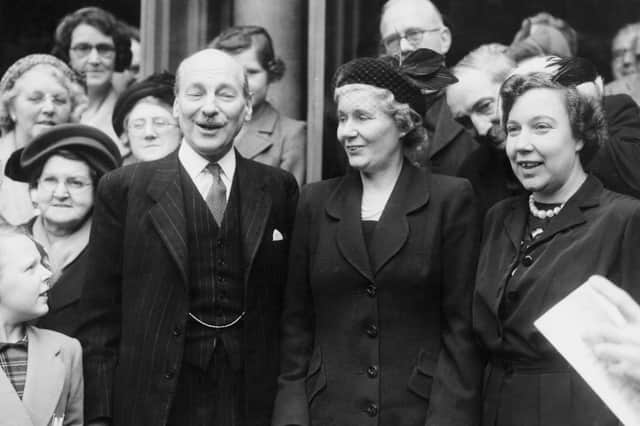Tory leadership contenders' ludicrous plans highlight opposition's lack of Clement Atlee-style vision – Joyce McMillan


Its main theme is the history of Haiti, and the little-told story of the island’s successful 1791 slave rebellion; but this history is set against the background of the lives of four young black Londoners today, part of a generation increasingly excluded from all the aspirations that once made up the British middle-class dream, and trapped in a capital built on an economic system that once thrived on the proceeds of slavery, and is now driving the planet towards a terrifying meltdown that leaves the characters sweltering in 45-degree heat on the Central Line.
And Bogeyman is only one of dozens of shows, in a festival mainly created by writers and performers under 40, that reflect that profound sense of despair and anger about the trajectory of our world. Responses range from revolutionary rage and deep depression to a meditative insistence on living in the moment.
Advertisement
Hide AdAdvertisement
Hide AdWhat they all have in common, though, is a sense of profound system failure, which mainstream politics has failed to tackle, or even, it seems, to notice; and the farce of the current Conservative leadership election, with its ludicrous promises to mend an economically broken Britain by cutting taxes, ditching human rights, and attacking “woke” culture, only serves to reinforce the feeling that whatever planet Liz Truss and Rishi Sunak are living on, it is not the troubled one inhabited by the vast majority of UK citizens.
Tempting as it is, though, to dwell on the current wreckage of the Tory free-market project that began in the 1980s, what is perhaps even more striking, at this point in UK politics, is the absolute failure of mainstream opposition parties to produce any kind of clear alternative vision. Ideology plays a strange role in British politics, and is not often explicitly discussed; politicians like to present themselves as practical men and women, unencumbered by theory.
In truth, though, the only consequence of this mainstream aversion to ideological debate, over the past 40 years, has been an overwhelming, silent acceptance of the free market ideology articulated so clearly by Margaret Thatcher in the 1970s and 80s.
It is a profoundly flawed ideology, for reasons which are now more obvious with every passing day. Yet it so perfectly serves the narrow financial interests of those who already hold massive economic power that it not only retains a near-complete grip on the Conservative Party, but also paralyses parties of the centre-left, notably Labour and the SNP, when it comes to mounting the sort of explicit and clear-sighted challenge to recent free market orthodoxy that is now obviously needed.
This is not entirely to disparage the current attempts of Gordon Brown and Nicola Sturgeon – twin inheritors of the same Scottish tradition of moderate social democracy and responsible government – to nudge the UK government towards urgent action on the cost-of-living crisis.
Gordon Brown is demanding the temporary nationalisation of energy companies that do not lower their prices, and a rational system of price control; although many would ask why he still feels obliged to suggest that such nationalisation should be temporary. Nicola Sturgeon has written to Boris Johnson, remarkably still Prime Minister, to ask for an immediate four-nations summit to discuss major UK Government action.
What is increasingly evident, though, is that the soft Blairite version of centre-left politics embraced by politicians like Gordon Brown and Nicola Sturgeon – always triangulating with big finance and big energy, always bailing them out with public cash – is no longer adequate either to deal with the crisis we face, or to win the support of a despairing younger generation.
What politics needs now is a clear vision of a different kind of future, where we stop wasting time on the failed market mantras of the 1980s, and start talking seriously about what kind of 21st century public sector and public realm we need, to support us through this crisis.
Advertisement
Hide AdAdvertisement
Hide AdTo judge by international examples, that public realm will need to be substantially bigger and better funded than it was in 2019, after a decade of austerity. It needs to be founded on serious investment in people and communities; higher wages, better benefits, and a vastly improved quality of strategic public investment in the industries of the future, notably renewable energy.
It will also, if it is to work, need to be far more seriously devolved, with power distributed far more deeply through local government and communities, than anything yet seen at UK or Scottish level. In order to navigate the coming crises – whether in an independent Scotland or in the UK as a whole – we will need an empowered citizenry that has the means and the basic security to develop local solutions; and to contribute those ideas and possibilities to the national and global debate.
And to those who say that we now cannot afford this kind of investment in our people and in their public life, I would simply say look back, just once, in order to look forward.
In 1945, in an economy broken by war, we could not “afford” any of the things the Attlee government planned to do, to invest in the people of Britain, and to lay the social foundations for the longest period of improvement in the prosperity, security and welfare of ordinary people this country has ever seen. Yet it was done.
And to those who say that we are not in a crisis on that scale now, demanding an equally brave and visionary response, I would say look once more at the burning world around you, and at the despair and anger on the faces of the young; and think again.
Comments
Want to join the conversation? Please or to comment on this article.

